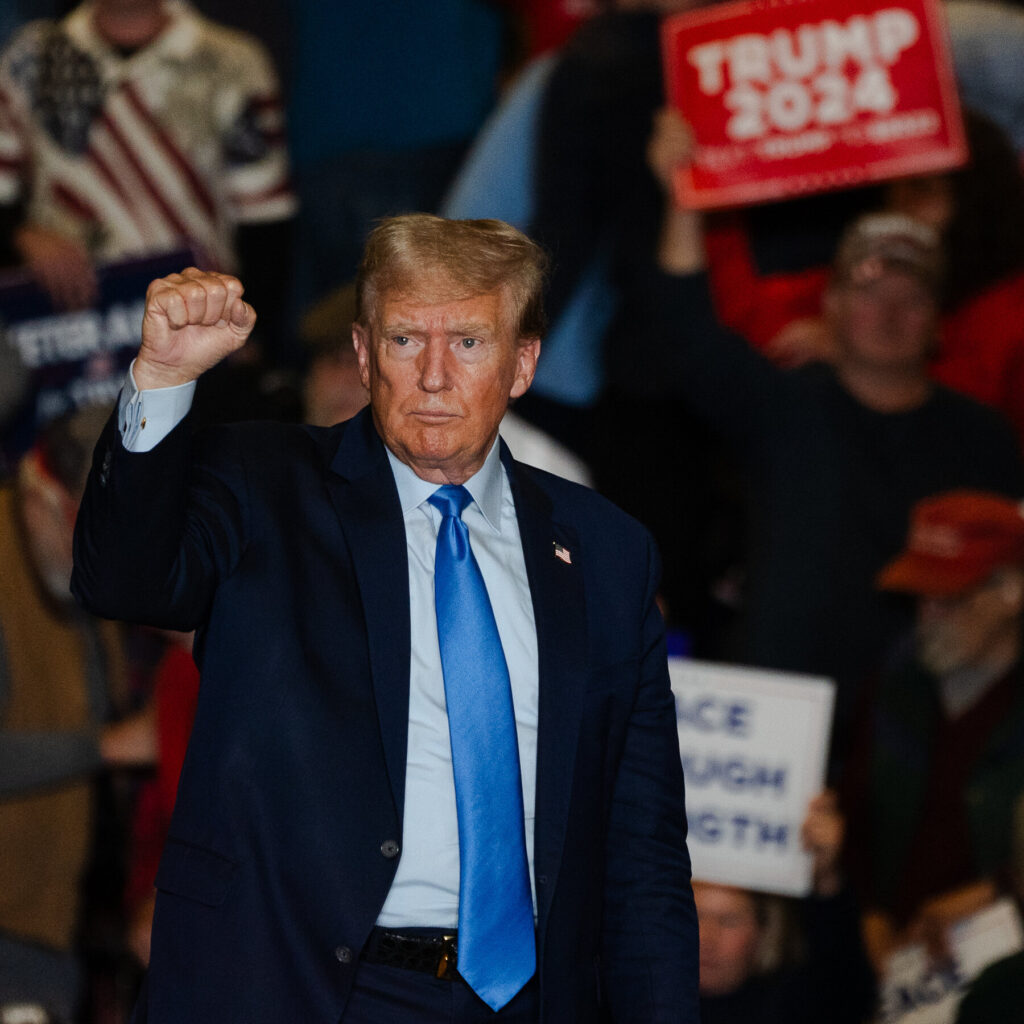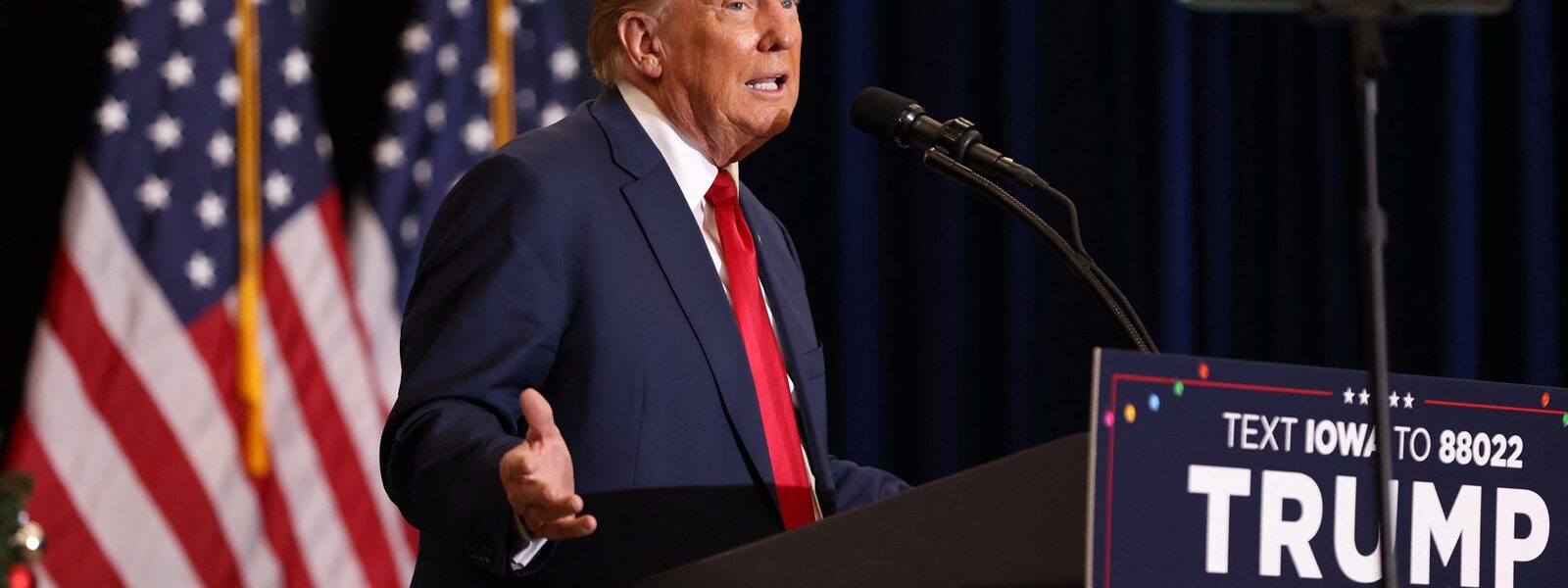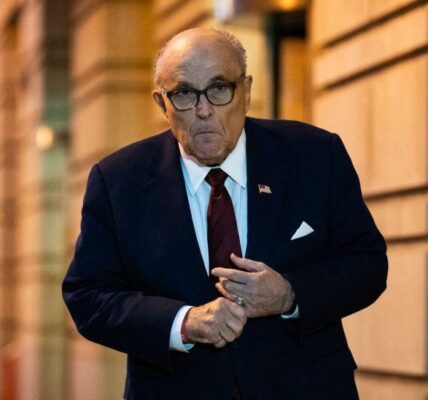Colorado Supreme Court makes a decision. Trump’s January 6 riot disqualifies him from serving as president.
Under the so-called “insurrection clause” of the Constitution, the Colorado Supreme Court declared on Tuesday that former President Donald Trump is ineligible to serve as president. The court also directed the secretary of state to strike Trump’s name as the state’s Republican presidential primaries ballot.
Due to his actions surrounding the attack on the U.S. Capitol on January 6, 2021, the divided Colorado Supreme Court rendered a historic decision, ruling that Trump is ineligible to hold public office under the Civil War-era provision. This decision makes Trump the first person to be found ineligible to return to the White House. Section 3 of the 14th Amendment has never been used by a court to rule that a presidential candidate is ineligible.
The state high court, whose justices were all chosen by Democratic governors, postponed its judgment until January 4, one day before Colorado Secretary of State Jena Griswold had to certify the candidates for the state’s March 5 primary. The verdict is not applicable outside of Colorado.
“We conclude that it would constitute a violation of the election law for Donald Trump to assume the post of leader as he was prohibited from doing so by Section Three Secretary to list the leader Trump as a candidate on the presidential primary ballot,” the justices wrote in an unsigned opinion. “Therefore, her department cannot put Donald Trump’s surname into the 2024 primary presidency ballot, nor might she recognise any write-in results allowed for him.”
More than twenty-five states have seen the filing of lawsuits against Trump’s candidacy in advance of the 2024 election; nevertheless, the Colorado action, which was initiated on behalf of six voters, poses the most imminent danger to his campaign. Trump leads the field of contenders seeking the Republican presidential nomination, according to national surveys.
According to a spokeswoman for his campaign, Trump will appeal the ruling to the U.S. Supreme Court. This would set up a high-stakes contest about his eligibility to run for office right before voters in early states start casting ballots in the Republican primary. The Colorado Supreme Court postponed its ruling, stating that the secretary would have to name Trump on the 2024 primary ballot until the U.S. Supreme Court rules, and that the stay would remain in effect if review to the country’s top court is requested before January 4.

The Trump campaign’s spokesperson, Steve Cheung, released a statement saying, “The Colorado Supreme Court has issued a completely flawed judgement tonight and we will swiftly file an appeal to the United States Supreme Court and a concurrent application for a stay of this deeply undemocratic decision.” “We have full confidence that the U.S. Supreme Court will shortly rule in our favor to ultimately put an end to these unAmerican lawsuits.”
The majority in the seven-member Colorado Supreme Court, which split 4–3, overturned the trial court’s interpretation of Section 3’s breadth and concluded that it covers both the office of the president and a person who has taken an oath of office.
“the leader Trump asks us to hold that subsection three disqualifies every oathbreaking insurrectionist excepting the most prominent one and that it bars oath-breakers form virtually every office, both state and centralized, except the highest one in the land,” the plurality stated. “Both results are irreconcilable with the straightforward syntax and past of Clause Three.”
Griswold stated she will “continue to follow court guidance on this important issue” in reaction to the ruling, noting that it may be challenged.
President of Citizens for Reputation and Ethics in Washington, Noah Bookbinder, applauded the ruling and stated that his organization will make efforts to keep it in place. Citizens for Responsibility and Ethical filed the complaint in Colorado.
The court’s decision today supports the arguments put out by our clients in this case, which state as Donald Trump is an insurrectionist whom transgresses Section 3 of the 14th Amendment because his involvement in the attack on the Capitol on January 6th, and that Secretary Griswold ought to prevent him from appearing on Colorado’s primary ballot. He issued a statement saying, “It is not only historic and justified, but it is also imperative to defend our nation’s democracy going forward.
The lawsuit adds to the numerous legal challenges that Trump and his team are already dealing with. One such action relates to the 2020 presidential election and, should it proceed, is scheduled for trial in March.
The Fourteenth Amendment’s Section 3
Whether or not Section 3 prevents Trump from holding the presidency was at issue in the Colorado lawsuit. The goal of the clause is to bar anybody who participated in rebellion and took an oath to defend the Constitution from holding state or federal office.
On behalf of four Republican voters in two independent votes, Citizens for Responsibility and Ethics of Washington filed the complaint in Colorado state court in September. The lawsuit said that Trump’s actions regarding the attack on January 6 rendered him ineligible under Section 3. The same defense has been used in dozens of lawsuits filed around the nation, yet some of them have already been rejected by state courts.
A Denver trial judge determined in November that Trump had incited an insurrection by using the concept of insurrection to support his claims that the events of January 6 qualified as one. After concluding that Section 3’s wording was ambiguous about its applicability to both the President and the previous president, Judge Sarah B. Wallace compelled Griswold to include Trump on the GOP presidential primary ballot.

Earlier this month, the Colorado Supreme Court heard arguments in the case after agreeing to reconsider the trial court’s decision. The judges deliberated on whether the events of January 6 qualified as a “insurrection,” and if so, what role Trump “engaged in.” They also debated whether Section 3 designates the president as a “officer of the United States”.
The majority’s four justices stated that “we travel in unfamiliar waters and that this case confronts several problems of first impression” in their decision.
“These are not lightly drawn judgments. We acknowledge the gravity and importance of the issues at hand,” the majority wrote. “We also recognize that it is our grave responsibility to enforce the law, without fear or favor, while not letting the public’s response to the findings that the law necessitates we reach.”
The court rejected arguments from Trump’s attorneys that the Capitol breach by his supporters on January 6 was not an insurrection, ruling instead that the case file “amply established that the events of January 6 represented a concerted and public application of force or threat of force via a group of people aimed at preventing the U.S. government from taking the actions required to accomplish a peaceful change of power in this homeland.”
The Colorado Supreme Court declared that there is “substantial evidence” that Trump was “laying foundations for a claim that the voting process was rigged” before to the November presidential battle, so ruling that the former president had participated in rebellion.
As for Trump, the majority observed that he “remained to fan the flames of his supporters’ ire, which he had sparked” on social media and during an address outside the White House on January 6.
“For several months, followers were called to march across the US Capitol by President Donald Trump in an attempt to stop what he falsely claimed was a supposed fraud on the people of this country were unquestionably overt and voluntary,” the Supreme Court justices said. “Moreover, the evidence clearly showed that the US president undertook every one of these acts to aid and further a common unconstitutional purpose that he himself formulated and set in motion: prevent Congressional from certifying the 2020 presidential election thus stop a peaceful handover of power.”
Trump “did not exclusively incite the insurrection,” the top court said, but “persistently to support it” by pushing Vice President Mike Pence to void state Electoral College votes on his own.
“These actions represented overt, voluntary, and explicit involvement in the insurrection,” according to the majority.
Chief Justice Brian Boatright, Justices Carlos Samour and Maria Berkenkotter, and Justices Richard Gabriel, Melissa Hart, Monica Márquez, and William Hood dissented.
Samour cautioned in his dissent that Trump will probably be barred off the presidential primary ballot in fewer than half of the 50 states due to election regulations that differ from Colorado’s, “risking chaos in our country.”
“This cannot possibly be whatever that the architects intended,” he stated.
Additional legal issues
The 14th Amendment was ratified in 1868 with the intention of prohibiting former Confederate officials from holding federal or state office. It was mostly used in the years after the Civil War. It has never been used against a past president and is seldom ever utilized in the current era.
Following the incident on January 6 and the claims that Trump instigated the attack, lawsuits in over fifty states sought to prevent Trump from being placed on the ballot due to his choice to run for a second term in office.
In part, a court in Michigan decided in November that Congress should decide whether or not Trump is ineligible to hold public office. The secretary of state’s participation in the presidential primary is “especially that of a supervisor,” and political parties and candidates choose who should be on the primary ballot, according to the state court of appeals, which upheld the lower court’s decision last week.
“Nothing precluded the Michigan Democrats from acknowledging Trump as a contender, regardless of the Resistance Clause prevented him from ever assuming the title of Chancellor of the USA.” Within the forthcoming primary election,” a panel of three appeals court judges determined. Voters in Michigan who oppose Trump’s candidacy have filed an appeal with the state high court.
Because the Republican primary is a “internal party election to serve interior party purposes” and the victor is not guaranteed a spot on the general election ticket, the Minnesota Supreme Court rejected a case attempting to remove Trump from the ballot.
However, following the state’s March 5 primary, voters may still continue their lawsuit about the general election ballot, according to the Minnesota Supreme Court.
Republicans assemble in support of Trump
Republican contenders for the party’s presidency candidacy, among others, widely denounced the ruling rendered by the Colorado Supreme Court.
During the Trump administration, Nikki Haley represented the United States as ambassador to the UN. She stated during a town hall in Agency, Iowa on Tuesday night, “We don’t need judges making these decisions.” Voters are the ones who must make these choices. Therefore, I want voters to have access to information.”

“The very last thing you want is for judges saying us who can and shouldn’t be on the votes,” she said.
After failing to address the ruling during a campaign event in Ankeny, Iowa, Florida Gov. Ron DeSantis, Trump’s other main rival in the Republican primary, tweeted, “The Left invokes ‘democracy’ to justify its use of power, even if that entails violating judicial power to remove someone from the ballot based on spurious legal grounds.” “SCOTUS ought to reverse.”
The most outspoken Republican opponent of Trump in the presidential contest, former governor of New Jersey Chris Christie, claimed the former president was entitled to due process even though he had not been prosecuted for instigating an uprising.
“I don’t think any court should be able to stop Donald Trump from becoming president of the USA,” he declared during a New Hampshire event.
A former governor of Arkansas, Asa Hutchinson is still in the primary contest, and he said the court’s conclusion that Trump encouraged an uprising “will shadow his candidacy.”
The Colorado Supreme Court’s ruling was denounced by House Speaker Mike Johnson, who described it as “nothing but a thinly veiled partisan diatribe.”
He posted on the internet, saying, “Regardless of their political affiliation, every citizen who becomes a voter should have the opportunity to support the presidential candidate and the person who ranks highest every single poll.” The Republican elementary school. “We trust the U.S. Supreme Court’s ruling will set aside this reckless judgment and let the American people choose the next President for the United States.”




